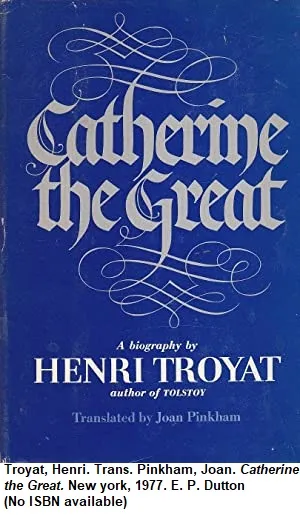
In a former entry I reviewed Virginia Rounding's biography of Catherine the Great, and I made a few comparisons between Rounding's well-composed, though a bit high-minded portrayal of the Czarina, and the more approachable, though often low-brow treatment given to the same empress by the French author Henri Troyat in his biography of Catherine, which I was reading at the time. Now that I have finished the latter, I thought it would make sense to give it a review. The difference between the two could not be more stark.
A Product of its Time
Bear in mind, Troyat's work was written by a Western European, during the height of the Cold War, and its topic is a Russian autocrat. As such, an ideological undercurrent of "our way is the only way to govern" fanaticism and undisguised disdain for all things Russian runs through the entire book. Chapter VI opens with this preamble.
Just as little by little Catherine had discovered the terrifying face of Elizabeth behind the idealized image of the great-hearted Czarina, so day by day she was discovering the true Russia - barbarous, cruel and wretched behind an appearance of civilization. Everything here was merely a deceptive facade. The efforts of Peter the Great to Europeanize his country had brought about only superficial changes. (p. 62)
This continues for four pages in this manner. And then later on there are more examples.
Russia was still subject to the complex, barbarous old code which Czar Alexis I Mikhailovich had promulgated in 1649. (p. 204)
And she [Catherine] played this double game effortlessly, now letting her heart speak and now her reason, now her taste for Western order and now her tenderness for Russian irrationality. (p. 208)
By a similar token, the author treats the institution of serfdom as though it were somehow unique to Russia (notwithstanding that the status of serfs was, in fact, lower in Russia than in most of Europe). The fact that the descriptions he gives of a Russian serf's lot in life sound like the way life had been for the commonfolk for centuries before (and would remain for centuries after) in neighboring Turkey and China, never seems to factor into the author's "you must understand how harsh and tyrannical Russia is" narrative.
But as I said, it was 1977. The entire world was locked into the "Capitalist pigs" vs the "Commie bastards," and Henri Troyat knew full well he was writing about the latter for the former. You can't berate the author for being in tune with his era and audience, so let's move on.
The "Ogress" of the North
Catherine, who had first been treated as a dilettante in politics, now appeared to all the Western chanceries as an evil genius, a sort of ogress, calculating and quick to act. (p. 211)
The book's most surprising feature, in my opinion, was the decidedly negative light in which Catherine II is portrayed. Throughout the biography, whenever there is room to question his subject's motives, Troyat almost universally ascribes to Catherine's actions the least desirable motivations possible: vanity...
All her life she had worked at building her own legend. No doubt she had loved the Russian people sincerely, passionately, but was not her personal glory her first thought when she signed an alliance or declared a war? ...The truth is that from conquest to conquest, it was Catherine herself who grew greater. (p. 396 & 397)
...duplicitous hypocrisy...
She had known instinctively all along that she must pity the serfs in theory and make the landed aristocracy her base of support in fact. (p. 197 & 198)
Her noble philosophical ideas did not prevent her from aggravating serfdom in Russia by the distribution of lands and peasants to those who served her throne or her bed. (p. 397)
...an absolute dearth of any feelings other than cold ambition...
If [Catherine] thought of that crown day and night, she scarcely troubled herself about what was beneath it. It did not matter to her that Peter Ulrich was ill-favored and a fool. Love was of no account in her calculations for the future. She was interested in the throne, not the bed. (p. 8)
Not for a second had she dreamed of weighing this "languishing suitor" against Grand Duke Peter. The promise of one day reigning over twenty million subjects was well worth the sacrifice of a passing fancy of childhood. (p. 12)
...And let us not forget, delusions of godhood. On multiple occasions (203, 208, 231) Troyat rather flatly refers to Catherine's circle of adoring writers and artists throughout Europe as her "cult," with Voltaire as their "high priest."
Troyat even goes so far as to say that the thing which is perhaps Catherine's signature achievement, that is, her status as a patron (matron?) of the arts throughout Europe, was in fact little more than a shameless campaign of publicity stunts worthy of present-day China.
She made a great show of protecting foreign writers and artists, but less from friendship for them than from a desire for favorable European propaganda. (p. 397)
Of course, I did not live in Russia at the end of the 18th century, so who's to say Mr. Troyat isn't right on the money? I'm simply commenting that it's a marked departure from the way Rounding (as well as most two-bit internet biographers of Catherine, for whatever the internet's opinion is worth) hold the "матушка b Санкт-Петербург" in such high esteem.
I Asked For a Biography, Not a Novel
The one thing about this biography that I found to be a constant irritant is the way the author writes about the feelings, attitudes, facial expressions, and the most minute details of carriage and bearing as if he was not only there, but was inside their heads. One occasionally forgets this is a biography of a historical figure, and not a work of historical drama with a semi-believable "based on actual events" note somewhere on the back cover.
The courtiers gathered around the sovereign for supper, which was served in five sittings of six hundred each. Potemkin stood behind her, wishing to serve her himself, but she would not allow it and insisted that he sit beside her. They presided over the banquet together as if Empress and Emperor. Not far from them Plato (1) Zubov, resplendent in his sky blue coat, took in their every move. He was not disturbed; he knew Catherine's real feelings. The affectionate homage she was rendering the Prince of Taurida did not commit her to anything. There was not a hint of promise in the look she sometimes turned toward the Serenissimus - only a kind of compassionate sadness...
...At two o'clock in the morning, Catherine took her leave. Plato Zubov followed her like a shadow. The orchestra performed a hymn composed in honor of Her Majesty. She spoke a few gracious words of thanks to Potemkin for his marvelous reception. He knelt on one knee, kissed the hand she held out to him and burst into sobs. Although she had not expressed what was really in her heart, he knew that this had been an evening of farewell. (p. 355 & 356)
Nor is this an isolated example. In truth, this is the style for most of the book. I'll grant that it makes the subject matter far more approachable (solving the problem that was my one major gripe against Rounding's work), but it certainly comes across as peddling opinions and fancies as facts.
So Who should Read It?
As I said in my review on Goodreads, I wish I had started with this one and graduated to Rounding's work afterward, rather than the other way around.
If you are not a serious historian , and would like a book that casually familiarizes you with one of Russia's most important rulers without being too ponderously academic, this book fits the bill. Chapters are arranged by category rather than chronology so there is an occasional glitch in the book's continuity, but if you do not need to pay close attention to which events happened concurrently and which ones were consecutive as long as the key events are there, this book fits the bill.
On the other hand, if you're a Russian History major writing a Senior Thesis on Catherine's life and you use this as one of your primary sources, your professor will probably send you to Siberia.
(1) In most other sources I've read, this name (Платон) is Romanized "Platon."

